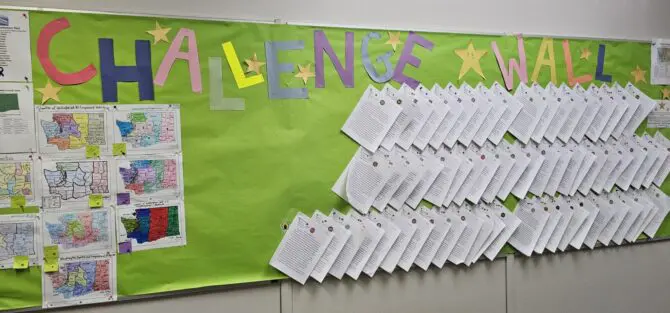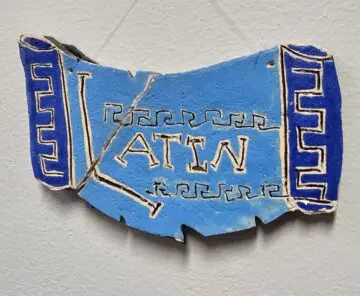Program Spotlight – Social Studies & Latin – October 2024
 Social Studies
Social Studies
6th Grade

In sixth grade, social studies, we just wrapped up our unit on history, stories, and identity. In this unit, students were introduced to the idea that history is full of stories (or historical accounts) that may be told from just one, two, or a variety of perspectives. The understanding that stories and perspective are strongly shaped by the identity of the storyteller was foundational to this unit. In the process, students explored their own identity, both personal and social, along with the social identity of places such as New York City, Disneyland, and even the various parts of a restaurant. The unit ended with an open note test.
7th Grade
Do you know the name of the founding document that governed the United States in the beginning and ultimately failed? Seventh grade students know now that it was the Articles of Confederation, and its failure led to the creation of the Constitution. Seventh grade students recently completed their first unit entitled “Road to the Constitution.” They learned valuable note-taking skills, non-fiction reading skills, and test preparation skills. The unit culminated with their first Big Question to answer in a paragraph or mini-essay for Challenge credit. An incredible fifteen students chose the mini-essay on their first assignment, and many students chose the Challenge question (there were two questions to choose from). The seventh grade curriculum continues through an overview of the Constitution, including specifics about a handful of the twenty-seven amendments. It is incredible to see the incredible effort from the students and interest in challenging themselves so early in their two-year social studies program at Explorer West.
8th Grade
With the election upon us, eighth grade students dove deep into how the Washington State government is both similar and different to the structure of the US government. They learned how initiatives and referendums work in Washington and how the executive branch in Washington is more accountable to citizens, as many of the positions in the executive branch are elected, rather than appointed. In order to dial up their writing skills in eighth grade, each section of reading is followed by an essential question that students answer in a paragraph or mini-essay. Building upon their incredible work in seventh grade, eighth graders have worked incredibly hard, especially by choosing so many mini-essays over paragraphs for these essential questions. In total this eighth grade has successfully completed eighty-six mini-essays so far this year, which is outstanding. As we progress through the year, I have no doubt that more and more students will embrace this challenge, as they see the benefits of their hard work in terms of their significant growth. Keep up the solid work, eighth graders!
Latin

Sixth grade Latin students have been tackling noun cases. They have been working steadily while their teacher was out with COVID.
Seventh graders started the year with an extensive verb and noun review. Then we picked up where most students left off last spring with chapter 7 of Suburani. This month we have learned two new verb tenses: the imperfect and perfect tense. These past tense verbs make it possible for the characters in Suburani to tell stories about their past. Catia, who is British, tells her Roman friends about her family’s blacksmithing business. She dispels superstitions about Druids, and sets the record straight about the day she first met Gisco crossing the bridge to Londinium. We had a tasting party to accompany the story about her discovery of new Mediterranean, including cucumbers, apples, and mint. Students read about the new goods traded between Rome and Britain at this time (c. 60 CE). It was fun to compare this list with the list of new world foods in the Columbian exchange. Last week, students had their first vocabulary quiz. As they learn the patterns for principal parts, these quizzes will become easier. They are rising to the challenge and becoming more adept at recognizing word forms.
Eighth grade students are getting into the routine of Roman history assignments being due Mondays at the start of class. All my subs were impressed by how they got to work and stayed productive throughout class.
